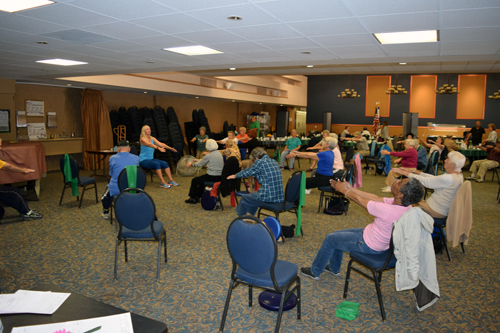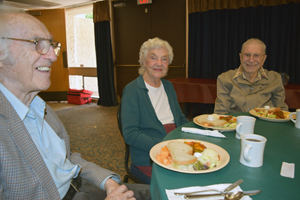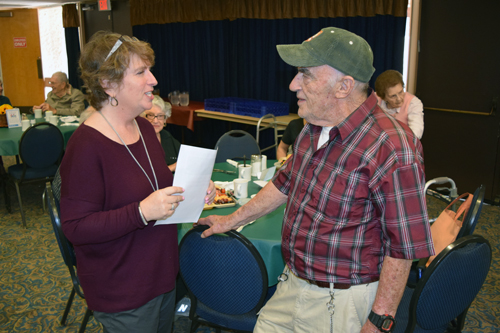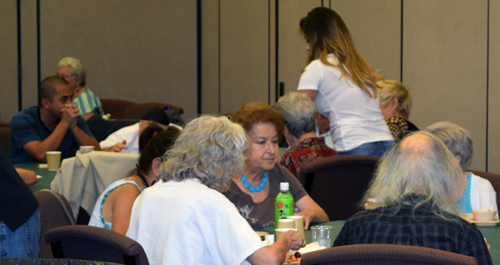
-27th in a Series–
Exit 10, College Avenue, JFS College Avenue Older Adult Center
By Donald H. Harrison

SAN DIEGO – Older adults who seek a low-cost meal plus both intellectual and physical stimulation often drop by the College Avenue Older Adult Center operated by Jewish Family Service in space rented from Temple Emanu-El at 6299 Capri Drive.
The center relocated to Temple Emanu-El in September 2015 from Beth Jacob Congregation, to the social hall of a Reform congregation from that of an Orthodox one.
The College Avenue Center is a County Nutrition Site, and to people over the age of 60, it serves healthy and hearty meals such as I sampled recently. On my plate was pepper steak, vegetables, mashed potato, fruit and a slice of bread, all to be washed down with Decaf coffee.

The cost: only $4, and that was not the best part. I sat with Gloria Rimland, whom I recognized as the pioneering first female president of Tifereth Israel Synagogue, and was introduced to two of her tablemates, both PhD professors emeritus at San Diego State University: Dr. Harold Wald, chemistry, and Dr. Kurt Eisenmann, mathematics.
I found attendees at the College Avenue Center to be quite friendly and open. Before lunch, in fact, two gentlemen had told me a little bit about their lives. Harry Rosen, born in Germany, had “a taste of the Nazis but thank God, my father was a very realistic person. He was from Poland and he remembered the pogroms. We were smuggled out to Belgium after they threatened to arrest him and send him to Dachau because he was against the fuehrer.”
That was in 1934, when Rosen was 11 years old. Belgium proved inhospitable. “We couldn’t get permanent residence, we were refugees without papers.” So next they moved to Haifa, in what was then Mandatory Palestine, and Rosen fought in Israel’s 1948 War of Independence. He was married the following year (1949) to the wife who only recently died after 63 years of marriage.
“I don’t want anybody else,” Rosen told me. Not that he hasn’t been getting offers, but he is wary that the women are more interested in what he can offer than in him. “They know I am still driving so everyone is coming close to me, and I have an apartment with two rooms. I’ve been approached already, by a woman, who wanted to know why I don’t rent one room out. Sure, driving, having my own apartment, and being in good shape!”
He had made his way from Israel to New York in 1960, and then pushed on to San Diego. “I didn’t speak any English at the time—and it was a hardship I didn’t want my family to go through. Besides when you come with family, you can’t stay with friends.”
The New York winter almost did Rosen in. He came down with bronchitis and doctors advised him to either return to Israel or go somewhere else in the United States where it is warm. A friend, who also had escaped Germany, invited him to settle in San Diego in 1961, a time, he remembered, when Mission Valley was nothing but dairy land. Liking it here, he sent for his family.
Rosen had worked in San Diego at the aircraft plants, mostly at Rohr, sometimes at Convair. “We accepted subcontracts from the big companies, and I used to build parts for the airplanes,” he told me.

Another man came up to me, introducing himself as Abraham Yarhi, formerly from Alexandria, Egypt.
“Since I’ve come here to Jewish Family Service, I don’t need any more medication,” he told me. “I am so lucky with the exercise and the food, it is a blessing. It keeps you alive and healthy. It’s a blessing for people who live close.”
About Alexandria, he said that it was a far more modern, cosmopolitan city than Cairo because “it is right on the Mediterranean Sea. Many boats came, and the people who lived there saw what people from other places wore, what they did, and the city became more modern than Cairo. The summer there is very nice to go to the beach. Many people from Cairo go to Alexandria in the summer to go to the beach.”
Earlier still, Elissa Landsman, program manager at the College Avenue Center, told me a little bit about the operation. It had started as a senior center at the old Jewish Community Center on 54th Street. When that facility closed in 1998, following the JCC’s move to La Jolla, the older adult program was moved to the social hall of Beth Jacob Congregation. It stayed there 17 years until relocating in September 2015 to Temple Emanu-El.
Landsman, who has a degree in recreation and leisure studies from Cal State Long Beach as well as a certificate in gerontology from San Diego State University, began volunteering in 1985 for Jewish Family Service and in 2000 was presented with an opportunity to become program director for the College Avenue Center.
“I know my purpose and I know my calling when I see the clients here; they are very friendly and loving,” she said. “I am a cheerleader and a shepherd and a planner, but I know that they feel very strongly about me and I feel very strongly about them.”
Particularly satisfying for her, in addition to keeping the seniors happy and busy with plenty of activities, is “when they have a pressing issue that they need help with, I can give them that help through our agency. I can refer them on to get some extra assistance… The nice thing about this population is that most of them are very happy, healthy and engaged, and it is very rewarding. We have a great program!”

In addition to the hot lunch, “we have things ranging from lectures, movies, dances, classes, exercise programs like aerobics, tai chi and yoga. We have painting classes, a bingo group, line dancing, ballroom dancing, drawing classes and current events classes. Sometimes we have Sunday lunches, and one Sunday it was salmon, and afterwards Yale Strom (a klezmer violinist) and his wife (Elizabeth Schwartz, a vocalist) were here to entertain us. We have entertainment on Fridays as well. We also have ancillary programs where people can meet with health insurance counselors. We have an attorney who comes here monthly. We have an AARP driving program (a refresher course on the rules of the road).”
Landsman said the center doesn’t count the people it serves as they come through the door, but rather monitors how many people attend activities. Thus if someone attends a morning exercise class, and an afternoon current events discussion, that person might be counted twice as a visitor.
On the average, she said, there are about 200 visitors per day, 70 of them exclusively for the lunch, and the rest attending the various activities. “I would say that the average age is between 68 and 72,” Landsman said. “When I started here 15 years ago I would say that 75 to 80 percent of the clients were Jewish. Today, I would say that the clientele is perhaps 50 percent Jewish. Mostly we serve people from the College area, Del Cerro, San Carlos, and Allied Gardens (neighborhoods of San Diego) and La Mesa.”
The group is multicultural, with various religions and backgrounds represented. “I do have Hispanic, African-American and Middle Eastern clients, so you do have some diversity,” she said. Various classes such as aerobics, feeling fit, and arthritis exercise are taught without fee by San Diego Continuing Education, a division of the San Diego Community Colleges, she said.
Even a short visit to the College Avenue Center will confirm that the place buzzes with energy.
*
Next: San Diego State University
*
Harrison is editor of San Diego Jewish World. Your comment may be sent to donald.harrison@sdjewishworld.com, or posted on this website provided that the rules below are observed.
__________________________________________________________________
Care to comment? We require the following information on any letter for publication: 1) Your full name 2) Your city and state (or country) of residence. Letters lacking such information will be automatically deleted. San Diego Jewish World is intended as a forum for the entire Jewish community, whatever your political leanings. Letters may be posted below provided they are responsive to the article that prompted them, and civil in their tone. Ad hominem attacks against any religion, country, gender, race, sexual orientation, or physical disability will not be considered for publication. There is a limit of one letter per writer on any given day.
__________________________________________________________________